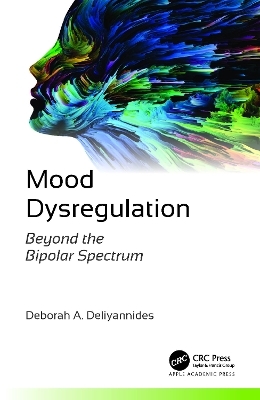
Mood Dysregulation
Apple Academic Press Inc. (Verlag)
978-1-77491-244-7 (ISBN)
Reflecting the author’s vast clinical experience as a psychiatrist, this volume explains why so many people with treatment resistant depression respond to medication used to treat individuals with bipolar disorder. The book also helps to minimize the bipolar stigma by introducing the concept of "mood dysregulation."
At present, people with mood dysregulation are not adequately described on the pages of any diagnostic manual. A cardinal feature of mood dysregulation is dysphoria, a negative mood that is poorly understood but mistaken for the negative mood of depression, creating diagnostic confusion, one of the sources of treatment resistant depression. The author explains that a preponderance of the people she has seen in her practice who have so-called depression have mood disorders with features of bipolar disorder, including response to medications typically effective in people with bipolar disorders. Thus, these people are research orphans: to this day, a paucity of literature exists on this group of individuals. In this volume, the author addresses the clinical problems that result from failure to recognize such mood disorders.
Key features of the book:
Provides a thorough discussion of dysphoria that is not found in other books on the market
Proposes a solution to a common and troublesome clinical problem, that of misidentified treatment resistant depression
Helps to destigmatize the treatments that are most beneficial to those with dysphoria by introducing the concept of "mood dysregulation"
Discusses the etiology of mood disorders with implications for prevention
This volume aims to help mental health professionals and patients more accurately recognize negative mood symptoms, dysphoria in particular, and arrive at more appropriate interventions to improve treatment outcomes for depression. No other book on the market takes up the topic of dysphoria and how its confusion with depression can lead to diagnostic mistakes that, in turn, lead to treatment failures and so-called treatment resistant depression.
Deborah A. Deliyannides, MD, graduated from Jefferson Medical College, Philadelphia, PA, and completed her psychiatric residency at the New York Hospital-Cornell Medical Center in White Plains, NY. She is Assistant Clinical Professor of Psychiatry at Columbia University College of Physicians and Surgeons, New York, NY, and has been a research psychiatrist at the New York State Psychiatric Institute since 1990, where she treated a vast array of people with mood disorders. She was Medical Director of the Zucker Hillside Hospital Methadone Maintenance Treatment Program at the Long Island Jewish Medical Centre in Glen Oaks, NY, for over 10 years and earned added qualifications in addiction psychiatry. She is currently a psychoanalytic candidate at the NYU Post Doctoral Program for Psychotherapy and Psychoanalysis, and maintains private practices in Manhattan and in Darien, CT.
1. HISTORICAL BACKGROUND 2. DSM MOOD DISORDERS 3. DIAGNOSTIC SYSTEMS 4. MOOD DYSREGULATION 5. CO-OCCURRING/RELATED CONDITIONS 6. BIOLOGY Brain 7. ETIOLOGY 8. TREATMENT 9. CLINICAL ILLUSTRATIONS
| Erscheinungsdatum | 20.07.2023 |
|---|---|
| Zusatzinfo | 14 Illustrations, color |
| Verlagsort | Oakville |
| Sprache | englisch |
| Maße | 152 x 229 mm |
| Gewicht | 480 g |
| Themenwelt | Schulbuch / Wörterbuch |
| Medizin / Pharmazie ► Allgemeines / Lexika | |
| Medizin / Pharmazie ► Medizinische Fachgebiete ► Neurologie | |
| Medizin / Pharmazie ► Medizinische Fachgebiete ► Psychiatrie / Psychotherapie | |
| Naturwissenschaften ► Biologie | |
| ISBN-10 | 1-77491-244-9 / 1774912449 |
| ISBN-13 | 978-1-77491-244-7 / 9781774912447 |
| Zustand | Neuware |
| Informationen gemäß Produktsicherheitsverordnung (GPSR) | |
| Haben Sie eine Frage zum Produkt? |
aus dem Bereich


